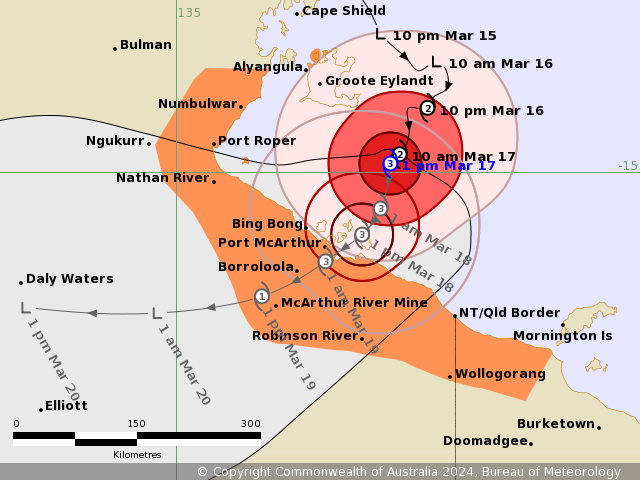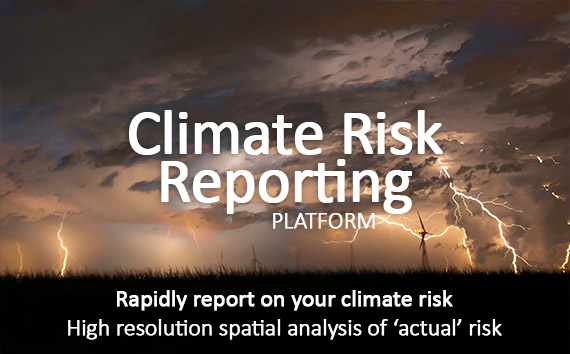Source: Bureau of Meteorology
Issued at 1:25 pm ACST [1:55 pm AEST] on Sunday 17 March
2024
Headline:
Severe Tropical Cyclone Megan has strengthened to category 3.
Impacts are beginning on the southwestern Gulf of Carpentaria
coast.
Areas Affected:
Warning Zone
Alyangula (Groote Eylandt) in NT to Mornington Island in Qld (not
including Mornington Island), extending inland to Borroloola,
McArthur River Mine, and Robinson River, but not including
Ngukurr.
Watch Zone
None.
Cancelled Zone
None.
Details of Severe Tropical Cyclone Megan at 12:30 pm ACST [1:00 pm
AEST]:
Intensity: Category 3, sustained winds near the centre of 120
kilometres per hour with wind gusts to 165 kilometres per
hour.
Location: within 20 kilometres of 14.9 degrees South 137.3 degrees
East, estimated to be 150 kilometres southeast of Alyangula and 170
kilometres northeast of Borroloola.
Movement: south southwest at 6 kilometres per hour.
Severe Tropical Cyclone Megan lies to the southeast of Groote
Eylandt and has strengthened to Category 3 intensity. Megan has
been moving slowly south-southwest, and is expected to strengthen
further before crossing the southwestern Gulf of Carpentaria coast
on Monday between Nathan River and the Northern
Territory/Queensland border.
Once over land, Megan will weaken and track west through the
Northern Territory as a tropical low.
Hazards:
Gales with DAMAGING WIND GUSTS to 110 km/h are currently being
experienced over parts of Groote Eylandt, and are expected to
persist for the remainder of Sunday.
Gales with DAMAGING WIND GUSTS to 110 km/h are occurring about the
Sir Edward Pellew Group. These gales are expected to extend to
coastal mainland areas between Nathan River and the NT/Qld border
later this afternoon, and to inland areas including Borroloola,
McArthur River Mine, and Robinson River overnight or on
Monday.
Gales with DAMAGING WIND GUSTS to 110km/h may extend further
northwest to Numbulwar in the NT, or east to Mornington Island in
Qld (not including Mornington Island), during the next 24 hours if
Megan moves further west or east than forecast.
DESTRUCTIVE WIND GUSTS in excess of 125 km/h are likely to develop
about the southwestern Gulf of Carpentaria coast, between Nathan
River in the NT and the NT/Qld border, from late this afternoon or
overnight as Megan moves closer to the coast.
The VERY DESTRUCTIVE CORE of Megan, with wind gusts up to 220
km/h, is expected to cross the coast between Nathan River in the NT
and the NT/Qld border during Monday.
INTENSE RAINFALL is possible about coastal parts of the
Carpentaria District as Megan approaches later today and during
Monday.
HEAVY RAINFALL is occurring over southeastern parts of the Top
End, with the heaviest falls in coastal and island locations. The
heaviest falls will extend further inland during today in the
Carpentaria forecast district as well as into parts of the Gulf
Country coast in Queensland.
Coastal residents between Nathan River and the Northern
Territory/Queensland border are specifically warned of a DANGEROUS
STORM TIDE as the cyclone centre crosses the coast. Tides are
likely to rise significantly above the normal high tide, with
DAMAGING WAVES and DANGEROUS FLOODING.
Abnormally high tides are expected over remaining parts of the
southern Gulf for the next few days, and will likely rise above the
normal high tide at times.
Recommended Action:
The Northern Territory Emergency Service advise:
For the communities in the area of the Cyclone Warning:
- Enact your household plan
- Prepare your property now
- Stay informed
- Take extra care on the roads
QFES advises:
People between the Queensland/ Northern Territory border and
Mornington Island, not including Mornington Island, should take
precautions and listen to the next advice.
- Information is available from your local government
- For cyclone preparedness and safety advice, visit Queensland's
Disaster Management Services website
(www.disaster.qld.gov.au)
- For emergency assistance call the Queensland State Emergency
Service (SES) on 132 500 (for assistance with storm damage, rising
flood water, fallen trees on buildings or roof damage).
Current
Tropical Cyclones

17/Mar/2024 04:27 AM



